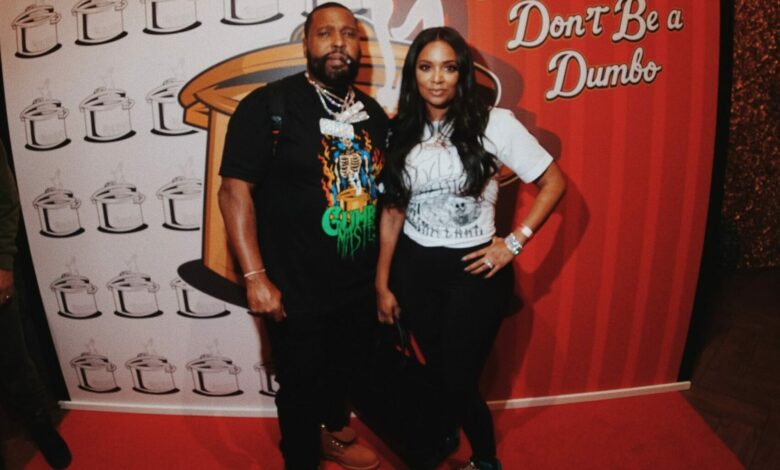
Black-Owned Cannabis Company Gumbo Brands Aims to Bring Diversity and Equity to the Billion-Dollar Industry
[ad_1]
The country has moved away from the criminalization of cannabis over the past several years, thus giving rise to a major new industry. Today, 19 states plus the District of Columbia have passed legislation to allow adult recreational use of cannabis, while 36 states and four territories allow for medical use, according to the National Council on Compensation Insurance. This increased legalization has put the marijuana market on track to hit $24 billion in the U.S. this year and $70.6 billion globally by 2028. On top of that, the industry has ballooned throughout the COVID-19 crisis, making legal marijuana one of the fastest-growing sectors in the nation, reports The Washington Post.
However, despite growing excitement around cannabis, people of color make up only a small number of those profiting from this lucrative industry, even though the war on drugs has disproportionately hurt them. In 2017, just 4.3% of marijuana business owners in the U.S. were Black while 81% were white, CNBC reports.
One company that has managed to crack into the industry is Gumbo Brands, a Black-owned cannabis lifestyle and apparel brand at the intersection of counterculture, community, and wellness. The company was founded in 2018 by Karim “Luka Brazi” Butler, who made his mark in Harlem, New York, peddling CDs and other merchandise in the ’80s and ’90s and then helping the popular rap group Dipset rise to stardom in the 2000s. Today, the New York native uses his connections and cache in hip-hop to promote Gumbo Brands.

“Gumbo is one of the best marijuana brands because we’re more in tune with the culture. I’ve lived the life of the streets. I come from these places, so I see the impact it has on my community,” Butler told AllHipHop.com.
In addition to pushing the brand in New York’s emerging cannabis market, Butler hopes to educate his community about the medicinal benefits of marijuana and steer them away from hard drugs.
“We’re getting them off this lean and opioids, giving them some good pot! We don’t want them to be leaned up, perked up, drinking fentanyl, and poppin’ pills. We want to lean them towards health. We’re more towards the flower. We’re using it as a tool to save the community,” he said.

Helping to build the company is Butler’s fiancé, Alexis Major, who operates as Gumbo’s chief financial officer. The former sports manager and agent says her interest in the marijuana business started from her passion for helping NFL players. After working in retail as a buyer for 10 years, Major began managing her brother, NFL star Jordan Reed, who the Washington Football Team drafted in 2013. She also began managing other players and witnessed the harmful effects prescribed opioids were having on their bodies.
“What I noticed is a lot of the players were becoming addicted to opiates. When you know you have athletes that play contact sports, especially gladiators such as football players, there’s a lot of injury,” she told BLACK ENTERPRISE. “In the NFL, because it’s a business, they need to be able to mask a number of injuries so that they can be ready for another Sunday.”
As a result, Major says that the opioids that she saw her players take to numb pain led to addiction.
“They put them on morphine right before games. They have them take oxycodone, OxyContin, they have them take Percocet, every opiate you can think of. They have them take it so that they are numb for those games. There’s no testing in the NFL for that,” said Major. “They’re very addictive, and they ruin people’s lives,” she continued, adding, “I had to figure out how to get them off these drugs.”
Major noticed that the players would smoke marijuana recreationally, not knowing that cannabis could help soothe physical pain.
“I set out to find a strain that would help focus in on different injuries, and I was able to come across a couple of strains that actually really made pain in their body dormant.”

Major says the strain helped wean former NFL defensive tackle Dominique Easley off opioids. Today, the Super Bowl champion is an investor, entrepreneur, and mental health and wellness advocate for cannabis.
Yet even though marijuana was helping the NFL players she manages, Major says they faced pricey fines and penalties from the league.
“The marijuana was 100% effective. The only problem was that for the NFL, marijuana is illegal, and it costs the player anywhere from $400,000 to $1 million, depending on what their contract is. That’s how much they’re fined for testing dirty for marijuana,” said Major. “Not only did we have to find the marijuana to get them off these heavy drugs that they’re able to do, then we had to figure out how to mask the marijuana for them not to test positive,” she added.
“We’re talking about cannabis. It doesn’t help the enhancement of the player. It doesn’t do anything to help them be better on the field,” she said. “But it helps save their lives.”
Seeing the lifesaving benefits that cannabis had on NFL players, Major and Butler are now working to bring more diversity and inclusion to the industry.
“What Luka and I are doing is helping others and educating others about getting into the cannabis business because the only way that we’re going to be able to level the playing field is by helping everyone get some type of wealth.”
To help raise awareness about Gumbo and the weed business, Butler and Major held a two-day pop-up during Rolling Loud New York, a three-day hip-hop concert in late October. Butler says the pop-up grossed $250,000 in merchandise sales.
“We wanted everyone to come out from our communities and come get a piece of Gumbo whether it be the sneaker, whether it be a t-shirt, whether it be a hoodie,” said Major. “We’re here in the community, and we’re taking at-risk youth and teaching them about the cannabis industry.”

The interactive activation also included informative panel discussions about marijuana reform, the cannabis business, and hip-hop, featuring New York City Public Advocate Jumaane Williams, Charise Williams, the chief of staff of the Illinois Criminal Justice Information Authority, Rashaad Lambert, ESVP and Director, Culture & Community, Forbes, and founder, For(bes) The Culture, among others.
“We wanted to show that particular target market that you can learn something, and you can be as successful as the rappers you’re watching on that stage,” she said. “We have to be the catalyst of that because if kids don’t see us and know our story, they don’t think it’s possible.”

In addition to educating and empowering people of color, Major stressed the importance of creating a blueprint in the industry to inspire young women.
“Putting my flag in the sand is very important not just to me, but the little girls that look up to me that after this interview will see it and say ‘wow, I could do that,’” she said. “That’s what’s important to me.”
[ad_2]




